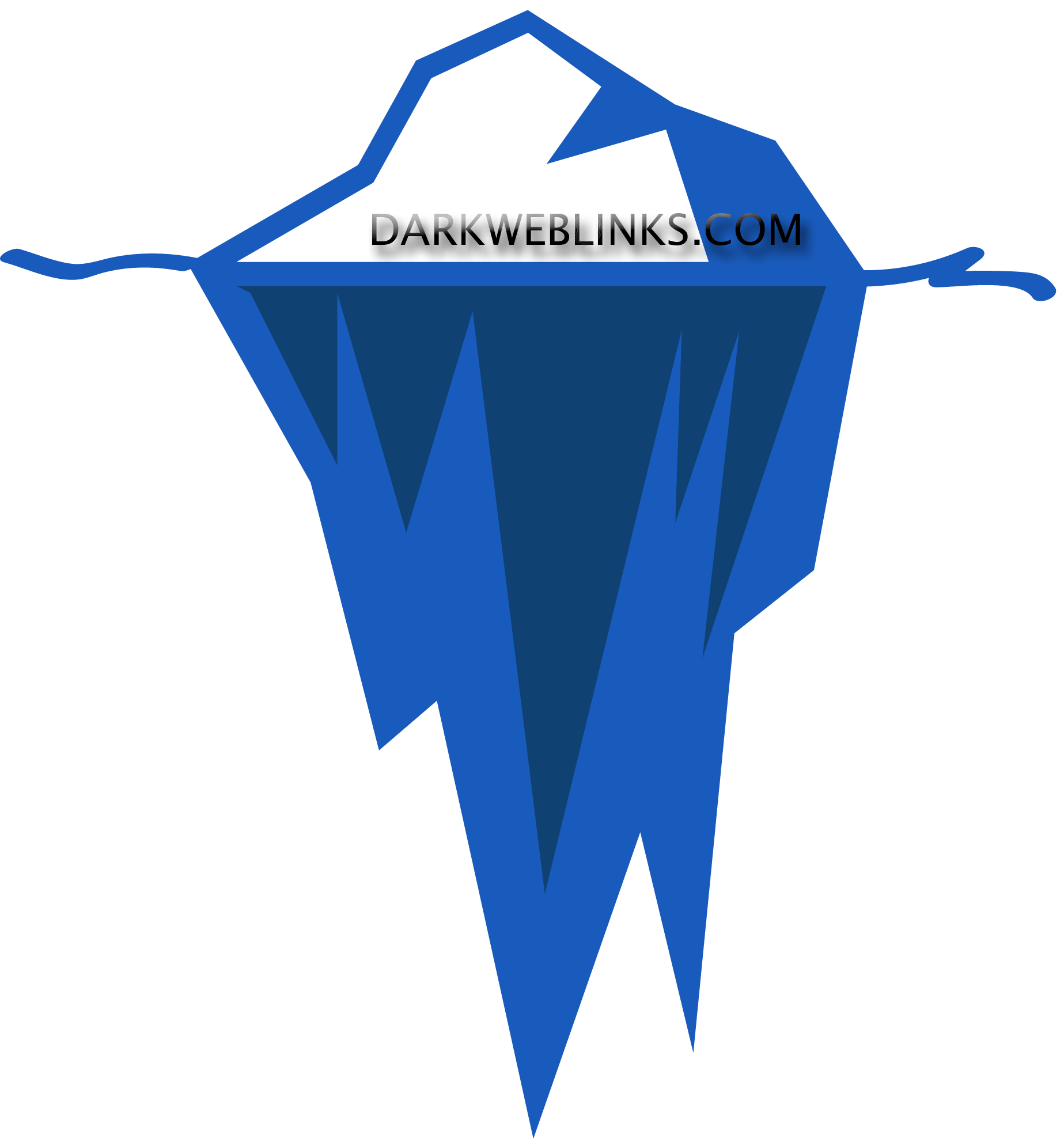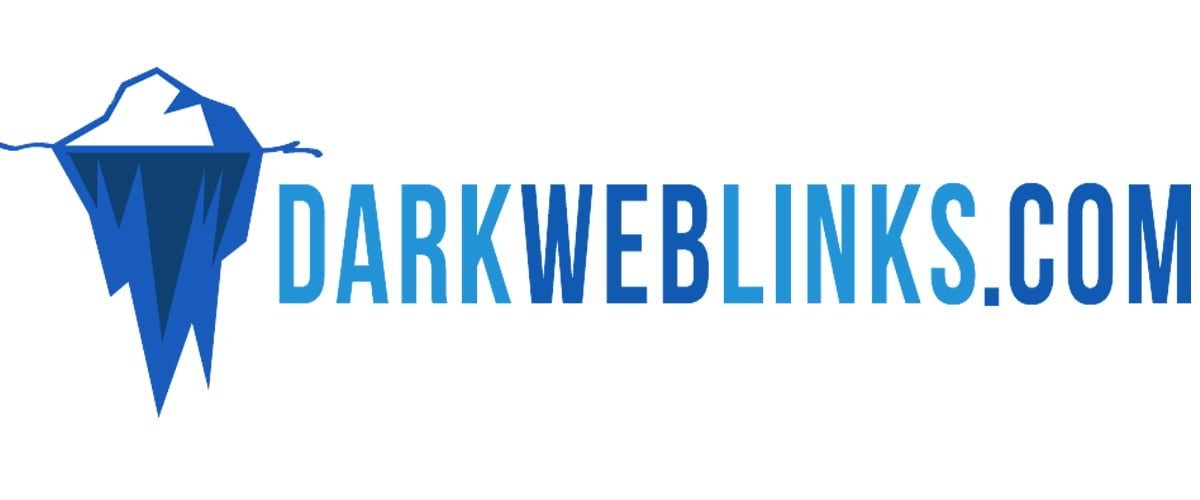🧩 PART 1: INTRODUCTION & CONCEPTS
🕸️What Is the Dark Web?
In 2025, the dark web remains one of the most misunderstood parts of the internet. Unlike the surface web, which includes everything indexed by search engines like Google or Bing, the dark web exists on encrypted networks and requires special tools like the Tor browser to access. It’s often confused with the deep web, but they are not the same thing.
The surface web is what most people use every day—websites like YouTube, Facebook, or Wikipedia. The deep web includes private content like your email inbox or banking information—pages not indexed by search engines. The dark web, however, is a smaller part of the deep web, intentionally hidden and accessed through anonymous networks.
So why does the dark web exist? In many cases, it’s about freedom from censorship, maintaining privacy, or enabling anonymous communication. In repressive regimes, the dark web provides a rare channel for journalists, activists, and researchers to communicate safely. Organizations like WikiLeaks and whistleblowers like Edward Snowden have famously used darknet tools to reveal government surveillance programs.
🔗 Most Visited .Onion Links in 2025
If you’re looking for real, working .onion links organized by category — including Financial Services, Commercial Services, Privacy Tools, Email Providers, Blogs, Hacking Sites, and more — we’ve made things simple for you.
You can scroll down to the end of this article to access our full list of categorized links. Just use the Navigation menu below to jump directly to any section and explore safe, verified onion addresses.
Navigation:
Introduction Points
Financial Services
Commercial Services
Drugs
Chans
Privacy Services
Email Providers
Blogs And Personal Sites
Hacking
News Sites
Open Source Software
Others
✅ Trusted Onion Directories to Start With:
Below are some of the most visited and reliable .onion directories in 2025. These are frequently updated and contain categorized lists of working onion sites, including privacy tools, forums, search engines, and more.
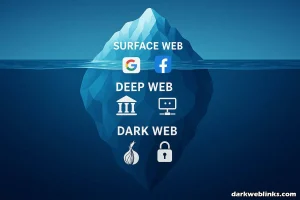
✅ Full Flow Example (How It Will Look in Context):
Welcome to DarkWebLinks.com — your trusted gateway to the hidden side of the internet. Whether you’re a privacy-conscious user, journalist, researcher, or simply curious about the dark web, this guide will help you explore it safely and confidently.
🧭 Start Exploring Trusted Dark Web Sites
Browse hundreds of real, working .onion links — verified, categorized, and regularly updated by our team.
👉 View Dark Web Sites Directory
In this complete homepage article, we’ll explain what the dark web is, how onion links work, the safest tools to explore hidden services, and how to avoid scams and dead links in 2025.
The dark web is also used for more everyday purposes: sharing restricted research data, protecting personal identity, or discussing sensitive topics that might be dangerous in public forums. While some associate it with illegal activity, not everything on the dark web is harmful or criminal.
Let’s clarify the terms: the dark web is part of the darknet (a type of encrypted overlay network), and both fall under the broader category of the deep web. Each serves a different purpose, but together they form a complex layer of the internet designed for anonymity, freedom, and secure access in the modern digital age.
🧠How the Dark Web Works – Behind the Scenes
To understand how the dark web functions in 2025, you need to look at the technology that powers it—primarily onion routing, the foundation of the Tor network. This method layers encryption like an onion, routing your data through multiple servers (called nodes) to hide your identity and location.
When you use the Tor Browser to access dark web links, your request is first sent to an entry node, which knows your IP address but not your final destination. It then travels through middle relays, which only know the previous and next nodes, further masking your path. Finally, the request exits through an exit node, which decrypts the data and sends it to the destination server—but never knows who sent it. This three-layer system makes tracing extremely difficult.
All dark web sites use special URLs that end in .onion, which are only accessible via the Tor network. These .onion domains aren’t stored like traditional websites. Instead, they’re cryptographically generated addresses, making them nearly impossible to guess or index without being shared directly.
While Tor is the most widely used dark web technology, it isn’t alone. Other decentralized networks also support anonymous browsing:
I2P (Invisible Internet Project) is built for anonymous communication and offers better speeds for internal services.
Freenet focuses on censorship-resistant publishing.
ZeroNet uses blockchain-like technology and BitTorrent protocols to create peer-to-peer websites.
Each of these tools plays a role in protecting privacy, supporting free speech, and resisting surveillance. Whether for ethical use or secure browsing, they form the infrastructure behind the hidden corners of the internet.
🔗 PART 2: DARK WEB LINKS & SITE ACCESS
🔗What Are Dark Web Links & .Onion Domains?
Dark web links are special URLs that lead to websites hosted on anonymous networks, most commonly the Tor network. These links typically end in “.onion” and are only accessible through the Tor Browser. Unlike regular URLs, .onion domains are not indexed by Google, Bing, or DuckDuckGo because they exist outside the surface web. This intentional design protects user anonymity and prevents unwanted discovery.
One challenge users face is that dark web links change frequently. This is partly due to security—site owners often rotate domains to avoid tracking, government takedowns, or DDoS attacks. Additionally, many sites disappear or go offline due to the temporary nature of anonymous hosting.
🛡️Need a deep dive into how dark web links function? Read this big explanation on dark web links.
Unfortunately, this creates an opportunity for fake or phishing sites to flourish. Many clone popular dark web sites with lookalike domains to trick users into giving up sensitive information or downloading malware. Spotting fakes requires caution: check for slight differences in URLs, verify the source of the link, and avoid any .onion link promising something too good to be true.
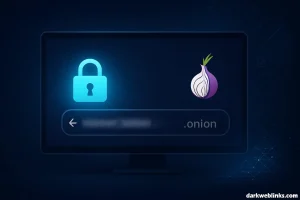
This is where curated dark web directories (like DarkWebLinks.com) play a crucial role. Trusted lists help users avoid scams and find verified, working sites across categories like markets, forums, email providers, and more. These directories are regularly updated to ensure reliability and safety.
Another technical shift was the transition from v2 to v3 onion links, completed in 2021. V3 addresses are longer and more secure, with 56 characters compared to the old 16-character v2 format. They use stronger encryption and are now the standard for legitimate dark web services.
Reliable directories and a cautious mindset are key to navigating this hidden part of the internet safely.
🛡️How to Access the Dark Web Safely
Accessing the dark web in 2025 isn’t illegal in itself, but doing it safely and anonymously is essential. The first step is to download and install the Tor Browser from the official Tor Project website. Tor is built to route your traffic through multiple nodes, anonymizing your location and activity.
For added protection, many users also enable a VPN. A VPN can hide your Tor usage from your ISP and protect you if Tor is blocked in your country. However, VPNs add a third party into your connection, so always choose a no-log, privacy-respecting provider. Some experts suggest using Tor without a VPN to maintain end-to-end encryption integrity. It’s a matter of trust and use case.
🔰If you’re new or unsure where to start, check out our complete guide on how to visit dark web sites in 2025.
If you want maximum anonymity, consider running a secure operating system. Tails OS is a portable Linux-based system that runs from a USB and erases all traces after shutdown. Whonix and Qubes OS offer advanced isolation—Whonix routes everything through Tor, while Qubes separates tasks into virtual machines.
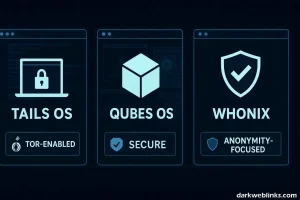
Before visiting any dark web links, follow these basic Do’s and Don’ts:
✅ Use updated tools (Tor, OS, antivirus)
✅ Visit only verified onion sites
❌ Don’t download random files
❌ Never log in with real credentials
Your device setup should include disabling all unnecessary services, using a script blocker (like NoScript), and turning off JavaScript when possible. Many attacks on dark web users exploit browser scripts.
🧭 Download the official Tor Browser from the Tor Project website
A cautious, well-prepared setup is the key to safely exploring dark web sites.
🧰Essential Tools to Browse the Dark Web Anonymously
Staying anonymous on the dark web in 2025 requires more than just using Tor. A well-rounded privacy setup combines tools that protect your identity, encrypt your data, and erase your digital footprint.
Start with a trusted VPN. Three of the best for dark web access include:
NordVPN – Popular for its speed, strict no-logs policy, and Double VPN feature.
Proton VPN – Built by CERN scientists, it offers Tor over VPN and is open source.
Mullvad – Known for allowing anonymous sign-ups and accepting cash payments.
These VPNs help mask your IP from your ISP, especially useful when Tor usage might be monitored.
For browsers, the Tor Browser remains the gold standard for accessing .onion links securely. However, Iridium Browser and Brave (with its built-in Tor tab) offer enhanced privacy for the surface web while keeping some anonymity tools handy. Still, they shouldn’t replace Tor for true dark web browsing.
To boost security, boot from a live operating system. Tails OS leaves no traces, while Qubes OS and Whonix offer advanced compartmentalization and Tor integration at the system level.
Secure storage is essential. Use passwordless vaults like Cryptomator for encrypted files and consider storing them on encrypted USB drives like IronKey or Verbatim Secure Pro.
For extra protection, real-time traffic masking tools such as obfs4 bridges, Snowflake, or Pluggable Transports make your Tor traffic appear like regular web use—helping bypass censorship and avoid detection.
Combining these tools ensures your access to dark web sites stays secure, anonymous, and as private as possible—even in high-surveillance environments.
🧭 PART 3: DISCOVERING CONTENT
✅Trusted Dark Web Sites to Visit in 2025
In 2025, finding trusted dark web sites is more important than ever. The dark web isn’t just a marketplace for illegal content—it also hosts communities, tools, and services focused on privacy, freedom of speech, and cybersecurity. While we do not link to any illegal platforms, there are many legitimate services still active and widely used by journalists, researchers, and privacy advocates.
🧅Want a quick snapshot of the top working links this month? Don’t miss our Top 25 Active Onion Links on the Dark Web (June 2025).
Categories of dark web content vary. Marketplaces still exist, though their lifespans are short and they often shift addresses due to law enforcement takedowns. Forums remain active for discussions on hacking, technology, and privacy, with some focusing on ethical hacking and open-source software. Hosting providers and privacy-focused service platforms offer secure .onion hosting, encrypted email services, and PGP-based messaging tools that are especially popular among cybersecurity professionals and activists.
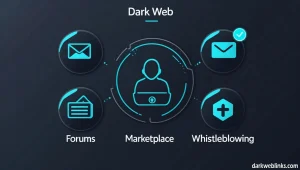
Some well-known dark web services have remained operational for years. For example, ProtonMail has maintained an onion version of its encrypted email service. SecureDrop and GlobaLeaks continue to offer whistleblowing platforms for anonymous reporting. Directories that verify dark web links, like yours, play an essential role in helping users safely navigate without encountering scams.
📍 Current paragraph in your article:
We take special care to list only the dark web sites that are actively maintained and accessible. Our team verifies every onion link before listing it, checking uptime, redirects, and safety signals.
➤ Looking for even more verified .onion links?
Explore our full Dark Web Sites directory — safe, categorized, and updated regularly.
Scams are a constant risk. Warning signs include slightly misspelled URLs that mimic real sites, poor website design, forced downloads, or sudden demands for payment. These are strong indicators of phishing or malicious intent.
There are also encrypted blogs, data breach monitoring sites, and cybersecurity forums where professionals share research and vulnerabilities. Many legitimate users rely on these services to stay informed and anonymous.
If you approach with caution and rely on curated directories, the dark web can provide powerful tools for privacy, free expression, and secure communication in a surveillance-heavy world.
🗂️Top Dark Web Directories and Indexes
🧩Hidden Wiki
The Hidden Wiki is the most widely known directory on the dark web. It offers a categorized index of popular .onion sites ranging from forums and marketplaces to whistleblowing platforms and privacy-focused services. Because it’s often the first place newcomers go when exploring the dark web, it has become a target for spoofed and malicious copies. Many cloned versions circulate with outdated or dangerous links, so users must be cautious. Despite its risks, the original Hidden Wiki remains a valuable starting point for discovering dark web links, especially for beginners who want a basic, organized overview of what’s out there.
🔎Ahmia
Ahmia stands out as a privacy-conscious search engine built specifically for dark web content. Unlike static directories, it indexes active .onion sites and presents them in a clean, user-friendly interface. Ahmia is integrated with the Tor Project and actively filters out illegal or malicious content. Its searchable format allows users to explore dark web sites more intelligently, offering real-time results from trusted sources. Ahmia doesn’t list everything, but its commitment to transparency and ethical indexing makes it a trusted resource for researchers, journalists, and those looking to avoid scams or harmful sites.
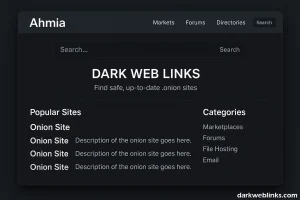
🔎 Explore .onion sites via the Ahmia dark web search engine
🔥Torch
Torch is one of the oldest and most extensive search engines on the dark web, offering access to millions of .onion pages. It’s known for its vast size and fast results but lacks strict moderation, which means users must navigate it carefully. Because it doesn’t filter illegal or dangerous content as thoroughly as Ahmia, Torch is more of a raw search tool than a curated index. However, for users seeking a wide range of dark web links and willing to apply their own judgment, Torch remains a powerful resource for exploring the hidden internet.
🧪NotEvil
NotEvil was created to replicate the look and functionality of surface web search engines like Google but tailored for .onion content. It offered fast, relevant search results across a variety of dark web sites without requiring accounts or tracking users. Although its uptime has been inconsistent in recent years, it was once a go-to index for anonymous browsing. If you find a working instance of NotEvil in 2025, approach it with care, as its maintenance and link freshness may not match more actively supported directories like Ahmia or Dark.Fail.
✅Dark.Fail
Dark.Fail has become a standout in the world of dark web indexes due to its focus on link authenticity and real-time uptime monitoring. It provides plain-text listings of verified onion services, complete with cryptographic proofs like PGP signatures and uptime charts. The site does not list illegal markets, which strengthens its reputation among journalists, developers, and privacy advocates. Dark.Fail includes links to secure communication tools, forums, and whistleblowing portals, all chosen for their legitimacy and stability. It’s widely considered one of the safest places to find current, trusted dark web links.
✅ Visit Dark.Fail to see real-time verified dark web services
(Note: You must use the Tor Browser to access this .onion site.)
⚖️Differences in Style, Safety, and Frequency
Each of these directories offers a different experience. The Hidden Wiki and Torch are large but loosely moderated, which means users can encounter both useful and harmful links. Ahmia and Dark.Fail focus on verified, safer listings and are better suited for users who prioritize privacy and legitimacy. NotEvil, while historically useful, may be less reliable today. Update frequency also varies—Dark.Fail and Ahmia are actively maintained, while others may go months without updates, increasing the risk of dead or compromised links.
🧩How to Cross-Check Onion Links
When browsing the dark web, cross-verifying .onion links is essential. A safe practice is to compare the same link across multiple directories—such as Ahmia, Dark.Fail, and your own curated list. If the link appears consistently across trusted sources, it’s more likely to be legitimate. Never rely on random Reddit threads, pastebins, or outdated blogs for .onion addresses, as these are common sources of phishing sites or fake marketplaces. Verifying links before clicking is a critical habit for anyone who values security while exploring the dark web.
🧭Want to explore safely? Here’s where to get real dark web links and how to use them.
🛒The Most Popular Marketplaces in 2025 (Short Reviews)
🛒 AlphaBay
AlphaBay has reclaimed its place as one of the largest and most trusted marketplaces on the dark web after its original takedown in 2017. The revived version brings stronger security and streamlined escrow support. It accepts Monero and Bitcoin, offering both wallet-based and walletless transactions. AlphaBay’s built-in rating system, active moderation, and vendor quality control help users avoid scams. However, its popularity makes it a frequent target for phishing clones, so verifying the correct .onion URL is essential.
🛒 Tor2Door
Tor2Door continues to grow in 2025 as a privacy-first dark web marketplace that avoids the need for user wallets. Payments go directly through escrow per transaction, reducing the risk of exit scams. The interface is intuitive, and both Bitcoin and Monero are supported. Users appreciate the site’s uptime consistency, strong vendor verification, and responsive support team. Its combination of simplicity and solid protection mechanisms has made it a top destination for secure darknet shopping.
🛒 Monopoly
Monopoly operates as an exclusive, invite-only marketplace on the dark web. It’s much smaller than AlphaBay but boasts a close-knit, well-vetted community. Vendors must pass strict quality checks, and the site supports walletless Monero transactions for better privacy. Monopoly has earned trust by avoiding spammy listings, enforcing high standards, and maintaining a clean interface. Its reputation for reliability and low scam risk makes it appealing for serious buyers.
🛒 CannaHome
CannaHome is a cannabis-focused marketplace on the dark web that continues to thrive due to its niche appeal and consistent service. Unlike generalized markets, it only lists cannabis-related products. Escrow protections are in place, and Monero is preferred. Its tight vendor approval process ensures quality and safety, while its clear reviews and active moderation help maintain user trust. For buyers looking strictly for cannabis products, CannaHome is a standout in 2025.
🛒 Cypher Market
Cypher Market has quickly become a rising star on the dark web due to its modern layout, transparency, and security practices. It supports multiple cryptocurrencies, offers strong escrow protection, and provides a detailed vendor rating system. Cypher also publishes transparency stats and listens closely to user feedback. It’s a favorite among privacy-conscious users who want reliability and ease of use combined with robust anonymity features.

🧩 Escrow, Wallets, and Vendor Ratings
Most top dark web marketplaces in 2025 use escrow as a safety buffer for transactions. Walletless payments—where funds are held only for each purchase—are now preferred over centralized wallets, which can be risky. Monero remains the most popular cryptocurrency due to its untraceable nature. Trustworthy markets display vendor ratings, customer feedback, and dispute resolution options to reduce fraud and help new users make informed choices.
🚨 What to Avoid: Exit Scams and Phishing Clones
Even the best markets can become dangerous if not accessed carefully. Exit scams still happen, especially on sites that require wallet funding. More common are phishing clones—fake sites that look identical to the original but with slightly altered .onion URLs. To stay safe, always double-check the full address and use trusted sources like Dark.Fail or verified directories. Bookmarking verified links after confirming them can help protect you from future impersonators.
⚠️ PART 4: LEGALITY & RISK EDUCATION
⚖️ Is It Legal to Access the Dark Web?
Accessing the dark web is not inherently illegal. In most countries, using the Tor Browser, visiting .onion sites, or reading forums is perfectly legal—as long as you’re not engaging in criminal activity. Many users visit the dark web for legitimate reasons like research, anonymous communication, or accessing censored information.
✅ What’s allowed
Exploring directories like the Hidden Wiki, reading articles, joining privacy-focused forums, and accessing whistleblowing platforms are legal in the vast majority of jurisdictions. Journalists, human rights workers, and tech researchers often use dark web links for professional purposes, especially in regions where surveillance is widespread.
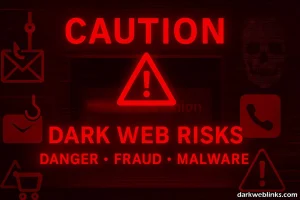
❌ What’s illegal
Illegal actions include buying or selling drugs, weapons, stolen data, hacking services, or hiring for criminal activities—even if the transaction isn’t completed. Merely accessing a dark web marketplace isn’t a crime, but attempting to buy illicit goods is. Hosting illegal content or running hidden services for cybercrime also falls under criminal law in nearly every country.
🌍 Risk by region
Laws vary. In the USA, UK, and Germany, browsing is legal but monitored. Investigations often begin if users interact with or attempt to purchase illicit content. In countries like India and Bangladesh, the laws are more ambiguous. While using Tor isn’t explicitly illegal, government scrutiny is high, and dark web activity could trigger attention—even if you’re not doing anything wrong.
🔍 When legal users get investigated
There are real cases where researchers, journalists, and even casual users were investigated just for visiting certain onion sites, especially if they accessed law enforcement honeypots or flagged marketplaces.
🔐 Privacy rights vs surveillance laws
While tools like Tor are designed to protect privacy, global surveillance laws increasingly pressure ISPs and tech platforms to log and report user activity. Always combine anonymous tools with caution and stay within legal boundaries to avoid unnecessary risk.
⚠️ Dangers You Must Avoid on the Dark Web
While the dark web offers anonymity and access to unique resources, it also comes with real risks—especially for new users. If you don’t take proper precautions, you can lose money, compromise your identity, or infect your system with malware. Understanding these threats is essential before exploring any dark web links.
🛑Concerned about malware or security threats? Find out if visiting a dark web site can get you infected.
💣 Malware Links & Ransomware
Many .onion sites host hidden malware. A single careless click on a file or image can install spyware, ransomware, or keyloggers onto your device. Some attackers target Tor users specifically, exploiting outdated browsers or OS vulnerabilities. Never download files unless you fully trust the source, and always use antivirus in combination with a secure OS like Tails or Whonix.
🕵️ Fake .onion Addresses
The dark web is filled with lookalike sites that use slightly altered .onion domains to mimic popular marketplaces or forums. These fakes may look identical but are designed to scam users or harvest credentials. Always check the full domain character by character, and only use verified directories like Dark.Fail or Ahmia to find legitimate links.
🎣 Phishing Clones of Real Markets
Just like on the surface web, phishing is rampant. Fake market clones trick users into entering login credentials or sending cryptocurrency to fraudulent wallets. These clones often rank on popular forums and blogs, making them look authentic. Double-check URLs and never log in unless you’re 100% certain the site is genuine.
🧩 Identity Leaks Through Logins or Cookies
Logging into dark web sites using the same credentials as your surface web accounts is a major mistake. Tor helps protect your IP, but login behaviors, cookies, and reused usernames can deanonymize you. Use unique credentials and disable all forms of tracking in your Tor settings.
💸 Exit Scams & Lost Crypto Funds
Some marketplaces operate for months before vanishing with all user funds—a tactic known as an exit scam. This typically happens on sites requiring internal wallets. Use walletless escrow markets and avoid keeping balances on any dark web site.
🔗 How to Verify a .onion Before Visiting
Always confirm a .onion link through multiple trusted sources. Cross-check URLs on directories like Dark.Fail, Ahmia, and your own curated list. Bookmark verified links once confirmed, and never rely on random Reddit threads or blogs alone. One wrong click can compromise everything.
🧰 PART 5: ADVANCED DARK WEB USERS SECTION
✉️ Anonymous Communication & Secure Email on the Dark Web
Maintaining privacy while communicating on the dark web is crucial. Whether you’re a whistleblower, journalist, or everyday user, anonymous messaging and secure email tools are essential for staying protected in 2025. Many platforms now offer dedicated .onion services to safeguard against surveillance and leaks.
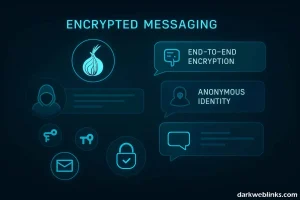
🔥To discover what’s trending this year, read our overview of Popular Darknet Sites in 2025.
📧 Privacy-First Email Services
ProtonMail is one of the most trusted email services offering a dedicated .onion site for enhanced privacy. It’s end-to-end encrypted, doesn’t log IP addresses, and is open source. Tutanota offers similar protections, although it currently lacks a Tor-specific address. For full dark web compatibility, users also rely on Secmail and Lelantos, which operate exclusively as onion-based email providers. These services are minimalistic and anonymous by design, with no personal information required during registration.
📧Access ProtonMail’s secure onion service here
💬 Onion-Based Messaging
For real-time anonymous communication, tools like TorChat, Ricochet, and Briar use decentralized or Tor-based networks to deliver peer-to-peer messaging without exposing your identity or metadata. TorChat routes messages through the Tor network, Ricochet uses ephemeral onion addresses for direct communication, and Briar works over Bluetooth or Wi-Fi without central servers—ideal for high-censorship regions.
🌐 Social Media Alternatives
On the dark web, traditional platforms like Facebook are replaced by anonymous communities like Dread, a Reddit-style forum for discussions on privacy, markets, and tech. SecureDrop allows journalists to receive files from whistleblowers safely. For decentralized conversation, Matrix offers end-to-end encrypted chat with bridges into the dark web.
📤 Visit SecureDrop to submit documents anonymously
🔐 PGP Encryption Basics
Pretty Good Privacy (PGP) remains the gold standard for secure messaging. It uses public and private keys to encrypt content, ensuring only the intended recipient can read your message. Learning basic PGP use is essential for anyone sharing sensitive data across dark web sites or email platforms.
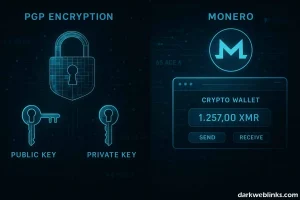
🪙 How Cryptocurrency Powers the Dark Web Economy
Cryptocurrency is the financial backbone of the dark web. It enables anonymous transactions between buyers and sellers without the need for banks, middlemen, or real-world identities. In 2025, Bitcoin is still widely used, but it’s far from flawless when it comes to privacy.
💰 Why Bitcoin Is Common but Flawed
Bitcoin remains the most recognized cryptocurrency on the dark web due to its widespread acceptance and liquidity. However, Bitcoin is not fully anonymous—its blockchain is public and all transactions can be traced. If a wallet is ever linked to your identity (via exchanges or leaks), your entire transaction history can be exposed. This has led many privacy-conscious users to look elsewhere.
🛡️ Monero and Zcash for True Anonymity
Monero (XMR) has become the go-to currency for real anonymity. It uses stealth addresses and ring signatures to fully obscure transaction details—making it nearly impossible to trace. Some marketplaces now accept Monero exclusively. Zcash also offers privacy features through “shielded transactions,” but it’s less commonly supported. For anyone serious about anonymity, Monero is the dark web’s most secure option.
🔍 How Transactions Are Traced
Blockchain analysis firms and law enforcement agencies use powerful tools to follow cryptocurrency trails. Bitcoin addresses can be clustered, analyzed, and de-anonymized—especially if you use centralized exchanges or re-use wallet addresses. Tor can hide your IP, but if your funds can be traced, your identity may still be at risk.
🔄 How to Mix Coins Using Tumblers
To break transaction trails, users often turn to Bitcoin mixers or tumblers. These services mix your coins with others, obscuring the source and destination. Some use decentralized, trustless protocols while others rely on centralized systems. Be cautious—some tumblers are scams or honeypots.
🔐 Wallet Safety and Cold Storage
Never store cryptocurrency directly on a dark web site. Use cold wallets—offline wallets that cannot be hacked remotely—to hold funds safely. Hardware wallets or air-gapped devices are best. For transactions, use a fresh, separate wallet that isn’t tied to your identity or past activity.
🔐 Best Practices for Long-Term Privacy
Exploring the dark web safely isn’t just about using Tor—it’s about developing privacy habits that hold up over time. Whether you’re a casual browser or a researcher, adopting consistent, long-term practices is essential to avoid exposure and maintain anonymity.
🧹 Erase Browser Traces After Every Session
Even though the Tor Browser doesn’t store history by default, other forms of tracking data—like cached images, cookies, or downloads—can linger. Always close the browser fully after use. Consider using live operating systems like Tails, which automatically wipe all traces upon shutdown, making your activity truly ephemeral.
🔖 Bookmark Trusted Directories, Not Random Onion Links
Never rely on links from anonymous forums or unverified sources. Instead, bookmark trusted directories like Ahmia, Dark.Fail, or your own curated list to avoid phishing sites. Even a single typo in a .onion link can lead to a clone site that’s designed to steal your data or crypto.
🗂️ Encrypt Important Documents
If you’re storing anything sensitive—like PGP keys, cryptocurrency wallet files, or communication logs—encrypt them using strong tools like VeraCrypt or GPG. This ensures your files remain protected even if your device is seized or compromised.
💽 Air-Gap Sensitive Files
The safest way to store ultra-sensitive data is to keep it completely offline, on an air-gapped USB or external drive. Never connect this device to the internet. This prevents malware or remote access attacks from compromising your most critical assets.
🔁 Recheck .Onion Sites Monthly
Because dark web sites frequently go offline or rotate addresses, it’s smart to review your bookmarks monthly. Many legitimate sites also post security updates or new PGP keys—if you don’t keep up, you might miss signs of a phishing replacement or admin compromise.
💬 PART 6: COMMUNITY & RESOURCE CENTER
💬 Forums, Communities, and Ethical Hacker Hubs
The dark web isn’t just a place for markets and anonymous tools—it’s also home to vibrant forums and knowledge hubs where people exchange ideas, security insights, and research. In 2025, several communities stand out as key spaces for those interested in privacy, ethical hacking, and digital security.
🧠 Dread: Reddit-Style Dark Web Forum
Dread is one of the most active and trusted forums on the dark web. Built to mimic Reddit, it offers threaded discussions on topics ranging from Tor security to vendor reviews. Dread is well-moderated, supports user anonymity, and features public discussions about both darknet markets and general security practices. It’s a great entry point for understanding how users interact, share news, and stay safe in the hidden internet.
🕶️ Darknet Avengers, Torum, HackerPlace
These three forums have developed strong followings in the cybersecurity and hacking scenes. Darknet Avengers focuses on deep technical topics including penetration testing, encryption, and exploits. Torum is a general-purpose darknet community with threads for both privacy beginners and advanced users. HackerPlace leans toward software development and infosec discussions. While the content can vary, these platforms are commonly used to exchange scripts, tools, and guides—some legal, some not.
🙋 Ask Security Questions Anonymously
One of the best aspects of dark web forums is the ability to ask security or privacy questions without exposing your identity. Users frequently seek help with VPN issues, Tor configuration, OPSEC, and encryption, often receiving well-informed responses from ethical hackers or researchers.
⚖️ Know the Difference Between Learning and Doing
There’s a clear distinction between learning how things work and using that knowledge illegally. Ethical hackers use forums to explore vulnerabilities and strengthen defenses, not to exploit systems. Always stay on the legal side of the line.
📚 Resources for Ethical Hacking
Many forums provide access to open-source tools, CTF challenges, and beginner courses. You’ll find links to GitHub repos, sandboxed practice environments, and guides on ethical hacking fundamentals—all without leaving the dark web ecosystem.
🌐 How to Submit a Dark Web Site to Our Directory
If you’ve discovered a working, useful, and safe .onion site or operate one yourself, we welcome your contribution. Our mission is to maintain a trustworthy and verified list of dark web links—and your input helps us grow and improve the resource for everyone exploring the hidden web in 2025.
📝 Link Submission Form
To submit a dark web site, simply use our submission form on the directory page. Include the full .onion URL, a short description of the service, and optionally, the site’s PGP key or verification message. Submissions without context or proper formatting may be ignored, so be clear and concise.
🔎 How We Verify Sites
Every submitted link undergoes a manual review. We verify uptime, SSL/Onion certificate authenticity, trust signals like community mentions (e.g., Dread or Ahmia), and PGP-signed messages from site owners. We also look for signs of phishing or clone behavior. Our goal is to ensure users only find safe, non-malicious dark web links in our listings.
🚫 What We Don’t Allow
We do not accept or list any sites related to illegal content, scam operations, or exploitative services. If a site promotes violence, trafficking, or illegal drug markets, it will be rejected outright. Our focus is on ethical use of the dark web—privacy tools, secure email services, forums, blogs, whistleblower platforms, and educational resources.
🤝 Become a Contributor
You can also become a trusted contributor to help us build a safer and cleaner dark web portal. Regular contributors who provide accurate submissions and corrections over time may be given a verification badge or editor role. This helps ensure our directory remains up-to-date and community-driven, with real human oversight.
🧾 PART 7: FINAL WORDS
🧭 Final Thoughts – Bookmark for Safe, Updated Dark Web Links
Our mission is simple but vital: to offer a curated, safe, and categorized directory of dark web links that puts users first. In a space often filled with confusion, scams, and risk, we aim to be a reliable source for those who value privacy, security, and verified access.
📂 Our site isn’t just a homepage—it’s a full resource hub. Be sure to explore our subpages that feature the latest marketplaces, hidden wiki-style indexes, onion tools, secure communication platforms, and more. Whether you’re researching, protecting your identity, or just curious about the technology behind the dark web, we’ve got you covered.
📬 We’re always improving, and your input matters. If you’ve found a valuable site or noticed something outdated, don’t hesitate to reach out or use our submission form. We welcome feedback, corrections, and suggestions from privacy-minded users who want to make the dark web safer and more accessible for others.
🔗 You can help too. Share this resource with fellow researchers, privacy advocates, or anyone looking to explore the dark web responsibly. The more people know where to find verified onion links, the fewer fall victim to phishing or scams.
🚀 Get Started – Browse Our Latest Dark Web Sites Now
Your journey into the hidden web should start from a trusted gateway. Bookmark our directory, visit often for updates, and explore with confidence knowing you’re using one of the web’s most reliable, human-reviewed dark web link directories.
🔍 Frequently Asked Questions
❓ What is the dark web used for?
The dark web is used for anonymous communication, accessing censored content, whistleblowing, and privacy-focused services.
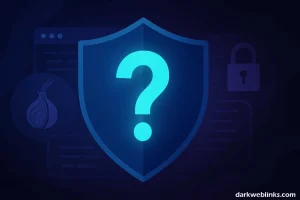
❓ Are dark web links legal to access?
Yes, accessing .onion links is legal in most countries. However, buying or hosting illegal content is not.
❓ How do I know if a dark web site is safe?
Use verified directories like Dark.Fail, Ahmia, or curated sites like DarkWebLinks.com to ensure safety.
❓ How can whistleblowers safely share information on the dark web?
Journalists and whistleblowers often rely on secure tools like SecureDrop and GlobaLeaks to anonymously submit files or leaks. These platforms are designed for maximum anonymity, without logging IP addresses or requiring accounts.
🕵️ Visit GlobaLeaks — a trusted platform for anonymous whistleblowing
❓ What is the best browser for dark web access?
Tor Browser is the safest and most widely accepted tool for browsing .onion sites.
❓ What cryptocurrency is safest on the dark web?
Monero is the most anonymous and widely used cryptocurrency for private transactions.
🧾 About DARKWEBLINKS.COM (Updated for 2025)
DarkWebLinks.com was created to offer a trusted, continuously updated directory of real, working .onion sites for privacy-conscious users. In a landscape filled with broken links, fake clones, and dangerous redirects, we aim to simplify the dark web experience with curated listings, human oversight, and a strong focus on safety.
We specialize in tracking active v3 .onion domains — the secure standard adopted after the Tor Project deprecated the older v2 links. Every submission is reviewed before being added, and we reject any content related to scams or illegal activity.
Our platform is designed to be accessible from both regular browsers and the Tor browser. Whether you’re a researcher, journalist, developer, or simply someone who values online anonymity, DarkWebLinks.com is your gateway to the safer side of the dark web.
DARKWEBLINKS.COM is only listing the most recent v3 .onion links. You may suggest v3 .onion dark web links be added to this site here. Many dark web sites did not yet upgrade to the new type of links, we will add them when they do. To access the dark web links below, you need the Torbrowser.
Navigation:
Introduction Points
Financial Services
Commercial Services
Drugs
Chans
Privacy Services
Email Providers
Blogs And Personal Sites
Hacking
News Sites
Open Source Software
Others
Introduction Points
OnionLinks s4k4ceiapwwgcm3mkb6e4diqecpo7kvdnfr5gg7sph7jjppqkvwwqtyd.onion
The Hidden Wiki paavlaytlfsqyvkg3yqj7hflfg5jw2jdg2fgkza5ruf6lplwseeqtvyd.onion
Another Hidden Wiki 2jwcnprqbugvyi6ok2h2h7u26qc6j5wxm7feh3znlh2qu3h6hjld4kyd.onion
The Dark Web Pug jgwe5cjqdbyvudjqskaajbfibfewew4pndx52dye7ug3mt3jimmktkid.onion
The Original Hidden Wiki zqktlwiuavvvqqt4ybvgvi7tyo4hjl5xgfuvpdf6otjiycgwqbym2qad.onion
Financial Services
AccMarket 55niksbd22qqaedkw36qw4cpofmbxdtbwonxam7ov2ga62zqbhgty3yd.onion
Cardshop s57divisqlcjtsyutxjz2ww77vlbwpxgodtijcsrgsuts4js5hnxkhqd.onion
Dark Mixer y22arit74fqnnc2pbieq3wqqvkfub6gnlegx3cl6thclos4f7ya7rvad.onion
Mixabit Bitcoin Mixer hqfld5smkr4b4xrjcco7zotvoqhuuoehjdvoin755iytmpk4sm7cbwad.onion
VirginBitcoins ovai7wvp4yj6jl3wbzihypbq657vpape7lggrlah4pl34utwjrpetwid.onion
ccPal xykxv6fmblogxgmzjm5wt6akdhm4wewiarjzcngev4tupgjlyugmc7qd.onion
Webuybitcoins wk3mtlvp2ej64nuytqm3mjrm6gpulix623abum6ewp64444oreysz7qd.onion
HQER odahix2ysdtqp4lgak4h2rsnd35dmkdx3ndzjbdhk3jiviqkljfjmnqd.onion
Counterfeit USD qazkxav4zzmt5xwfw6my362jdwhzrcafz7qpd5kugfgx7z7il5lyb6ad.onion
EasyCoin Bitcoin Mixer mp3fpv6xbrwka4skqliiifoizghfbjy5uyu77wwnfruwub5s4hly2oid.onion
Onionwallet Bitcoin Mixer p2qzxkca42e3wccvqgby7jrcbzlf6g7pnkvybnau4szl5ykdydzmvbid.onion
Commercial Services
DarkWebHackers prjd5pmbug2cnfs67s3y65ods27vamswdaw2lnwf45ys3pjl55h2gwqd.onion
Mobile Store rxmyl3izgquew65nicavsk6loyyblztng6puq42firpvbe32sefvnbad.onion
Kamagra 4 Bitcoin vhlehwexxmbnvecbmsk4ormttdvhlhbnyabai4cithvizzaduf3gmayd.onion
OnionIdentityServices ymvhtqya23wqpez63gyc3ke4svju3mqsby2awnhd3bk2e65izt7baqad.onion
UkGunsAndAmmo k6m3fagp4w4wspmdt23fldnwrmknse74gmxosswvaxf3ciasficpenad.onion
USfakeIDs lqcjo7esbfog5t4r4gyy7jurpzf6cavpfmc4vkal4k2g4ie66ao5mryd.onion
EuroGuns t43fsf65omvf7grt46wlt2eo5jbj3hafyvbdb7jtr2biyre5v24pebad.onion
Apples4Bitcoin okayd5ljzdv4gzrtiqlhtzjbflymfny2bxc2eacej3tamu2nyka7bxad.onion
UKpassports 3bp7szl6ehbrnitmbyxzvcm3ieu7ba2kys64oecf4g2b65mcgbafzgqd.onion
USAcitizenship gd5x24pjoan2pddc2fs6jlmnqbawq562d2qyk6ym4peu5ihzy6gd4jad.onion
Rent-A-Hacker kq4okz5kf4xosbsnvdr45uukjhbm4oameb6k6agjjsydycvflcewl4qd.onion
Drugs
DCdutchconnectionUK wbz2lrxhw4dd7h5t2wnoczmcz5snjpym4pr7dzjmah4vi6yywn37bdyd.onion
DrChronic iwggpyxn6qv3b2twpwtyhi2sfvgnby2albbcotcysd5f7obrlwbdbkyd.onion
TomAndJerry rfyb5tlhiqtiavwhikdlvb3fumxgqwtg2naanxtiqibidqlox5vispqd.onion
420prime ajlu6mrc7lwulwakojrgvvtarotvkvxqosb4psxljgobjhureve4kdqd.onion
Bitpharma guzjgkpodzshso2nohspxijzk5jgoaxzqioa7vzy6qdmwpz3hq4mwfid.onion
EuCanna n6qisfgjauj365pxccpr5vizmtb5iavqaug7m7e4ewkxuygk5iim6yyd.onion
Smokeables kl4gp72mdxp3uelicjjslqnpomqfr5cbdd3wzo5klo3rjlqjtzhaymqd.onion
CannabisUK 7mejofwihleuugda5kfnr7tupvfbaqntjqnfxc4hwmozlcmj2cey3hqd.onion
Brainmagic 2ln3x7ru6psileh7il7jot2ufhol4o7nd54z663xonnnmmku4dgkx3ad.onion
NLGrowers usmost4cbpesx552s2s4ti3c4nk2xgiu763vhcs3b4uc4ppp3zwnscyd.onion
Peoples Drug Store xf2gry25d3tyxkiu2xlvczd3q7jl6yyhtpodevjugnxia2u665asozad.onion
DeDope sga5n7zx6qjty7uwvkxpwstyoh73shst6mx3okouv53uks7ks47msayd.onion
Chans
8Chan 4usoivrpy52lmc4mgn2h34cmfiltslesthr56yttv2pxudd3dapqciyd.onion
Nanochan nanochanqzaytwlydykbg5nxkgyjxk3zsrctxuoxdmbx5jbh2ydyprid.onion
Picochan picochanwvqfa2xsrfzlul4x4aqtog2eljll5qnj5iagpbhx2vmfqnid.onion
Endchan enxx3byspwsdo446jujc52ucy2pf5urdbhqw3kbsfhlfjwmbpj5smdad.onion
256Chan dngtk6iydmpokbyyk3irqznceft3hze6q6rasrqlz46v7pq4klxnl4yd.onion
THE END theendgtso35ir6ngdtyhgtjhhbbprmkzl74gt5nyeu3ocr34sfa67yd.onion
Privacy Services
Snopyta cct5wy6mzgmft24xzw6zeaf55aaqmo6324gjlsghdhbiw5gdaaf4pkad.onion
Riseup vww6ybal4bd7szmgncyruucpgfkqahzddi37ktceo3ah7ngmcopnpyyd.onion
Vyempire.xyz wnrgozz3bmm33em4aln3lrbewf3ikxj7fwglqgla2tpdji4znjp7viqd.onion
SystemLi.org 7sk2kov2xwx6cbc32phynrifegg6pklmzs7luwcggtzrnlsolxxuyfyd.onion
Cryptostorm VPN stormwayszuh4juycoy4kwoww5gvcu2c4tdtpkup667pdwe4qenzwayd.onion
Privacy Tools privacy2zbidut4m4jyj3ksdqidzkw3uoip2vhvhbvwxbqux5xy5obyd.onion
TiTan XMPP titanxsu7bfd7vlyyffilprauwngr4acbnz27ulfhyxrqutu7atyptad.onion
Email Providers
Cock.li xdkriz6cn2avvcr2vks5lvvtmfojz2ohjzj4fhyuka55mvljeso2ztqd.onion
Elude.in eludemailxhnqzfmxehy3bk5guyhlxbunfyhkcksv4gvx6d3wcf6smad.onion
Sonar Tor Messenger sonarmsng5vzwqezlvtu2iiwwdn3dxkhotftikhowpfjuzg7p3ca5eid.onion
ProtonMail protonmailrmez3lotccipshtkleegetolb73fuirgj7r4o4vfu7ozyd.onion
RiseUp Email 5gdvpfoh6kb2iqbizb37lzk2ddzrwa47m6rpdueg2m656fovmbhoptqd.onion
Blogs And Personal Sites
qorg11.net lainwir3s4y5r7mqm3kurzpljyf77vty2hrrfkps6wm4nnnqzest4lqd.onion
Course Enigma cgjzkysxa4ru5rhrtr6rafckhexbisbtxwg2fg743cjumioysmirhdad.onion
Kill-9 killnod2s77o3axkktdu52aqmmy4acisz2gicbhjm4xbvxa2zfftteyd.onion
Digdeeper digdeep4orxw6psc33yxa2dgmuycj74zi6334xhxjlgppw6odvkzkiad.onion
Spware Watchdog spywaredrcdg5krvjnukp3vbdwiqcv3zwbrcg6qh27kiwecm4qyfphid.onion
MayVaneDay Studios meynethaffeecapsvfphrcnfrx44w2nskgls2juwitibvqctk2plvhqd.onion
Shadow Wiki zsxjtsgzborzdllyp64c6pwnjz5eic76bsksbxzqefzogwcydnkjy3yd.onion
Outer Space reycdxyc24gf7jrnwutzdn3smmweizedy7uojsa7ols6sflwu25ijoyd.onion
Tech Learning Collective lpiyu33yusoalp5kh3f4hak2so2sjjvjw5ykyvu2dulzosgvuffq6sad.onion
Fuwa Fuwa fwfwqtpi2ofmehzdxe3e2htqfmhwfciwivpnsztv7dvpuamhr72ktlqd.onion
S-Config xjfbpuj56rdazx4iolylxplbvyft2onuerjeimlcqwaihp3s6r4xebqd.onion
Hacking
Defcon g7ejphhubv5idbbu3hb3wawrs5adw7tkx7yjabnf65xtzztgg4hcsqqd.onion
InfoCon w27irt6ldaydjoacyovepuzlethuoypazhhbot6tljuywy52emetn7qd.onion
News Sites
ProPublica p53lf57qovyuvwsc6xnrppyply3vtqm7l6pcobkmyqsiofyeznfu5uqd.onion
Darknetlive darkzzx4avcsuofgfez5zq75cqc4mprjvfqywo45dfcaxrwqg6qrlfid.onion
Open Source Software
OnionShare lldan5gahapx5k7iafb3s4ikijc4ni7gx5iywdflkba5y2ezyg6sjgyd.onion
Whonix dds6qkxpwdeubwucdiaord2xgbbeyds25rbsgr73tbfpqpt4a6vjwsyd.onion
Qubes OS www.qubesosfasa4zl44o4tws22di6kepyzfeqv3tg4e3ztknltfxqrymdad.onion
Keybase.IO keybase5wmilwokqirssclfnsqrjdsi7jdir5wy7y7iu3tanwmtp6oid.onion
Bitcoin Core 6hasakffvppilxgehrswmffqurlcjjjhd76jgvaqmsg6ul25s7t3rzyd.onion
Wasabi Wallet wasabiukrxmkdgve5kynjztuovbg43uxcbcxn6y2okcrsg7gb6jdmbad.onion
The Tor Project 2gzyxa5ihm7nsggfxnu52rck2vv4rvmdlkiu3zzui5du4xyclen53wid.onion
Others
CIA.gov ciadotgov4sjwlzihbbgxnqg3xiyrg7so2r2o3lt5wz5ypk4sxyjstad.onion
Internet Archive archivebyd3rzt3ehjpm4c3bjkyxv3hjleiytnvxcn7x32psn2kxcuid.onion
Bible4u bible4u2lvhacg4b3to2e2veqpwmrc2c3tjf2wuuqiz332vlwmr4xbad.onion
Imperial Library kx5thpx2olielkihfyo4jgjqfb7zx7wxr3sd4xzt26ochei4m6f7tayd.onion
Comic Book Library nv3x2jozywh63fkohn5mwp2d73vasusjixn3im3ueof52fmbjsigw6ad.onion
Tor Paste torpastezr7464pevuvdjisbvaf4yqi4n7sgz7lkwgqwxznwy5duj4ad.onion
Fuck Facebook 4wbwa6vcpvcr3vvf4qkhppgy56urmjcj2vagu2iqgp3z656xcmfdbiqd.onion
Just Another Library libraryfyuybp7oyidyya3ah5xvwgyx6weauoini7zyz555litmmumad.onion
Google Feud lkqx6qn7whctpdjhcoohpoyi6ahtrveuii7kq2m647ssvo5skqp7ioad.onion
NCIDE Police Task Force ncidetfs7banpz2d7vpndev5somwoki5vwdpfty2k7javniujekit6ad.onion
Rewards For Justice he5dybnt7sr6cm32xt77pazmtm65flqy6irivtflruqfc5ep7eiodiad.onion
Ablative Hosting hzwjmjimhr7bdmfv2doll4upibt5ojjmpo3pbp5ctwcg37n3hyk7qzid.onion
KlosHost kaizushih5iec2mxohpvbt5uaapqdnbluaasa2cmsrrjtwrbx46cnaid.onion
SporeStack Hosting spore64i5sofqlfz5gq2ju4msgzojjwifls7rok2cti624zyq3fcelad.onion
Blockstream BTC Explorer explorerzydxu5ecjrkwceayqybizmpjjznk5izmitf2modhcusuqlid.onion
BlockChair BTC Explorer blkchairbknpn73cfjhevhla7rkp4ed5gg2knctvv7it4lioy22defid.onion
Shitposting Forum bombsjy5lsgehdyuevxu5kt3zdw22bfqrhbanc32evab3o3j3dvc7cid.onion
The Longest Onion Index jptvwdeyknkv6oiwjtr2kxzehfnmcujl7rf7vytaikmwlvze773uiyyd.onion
